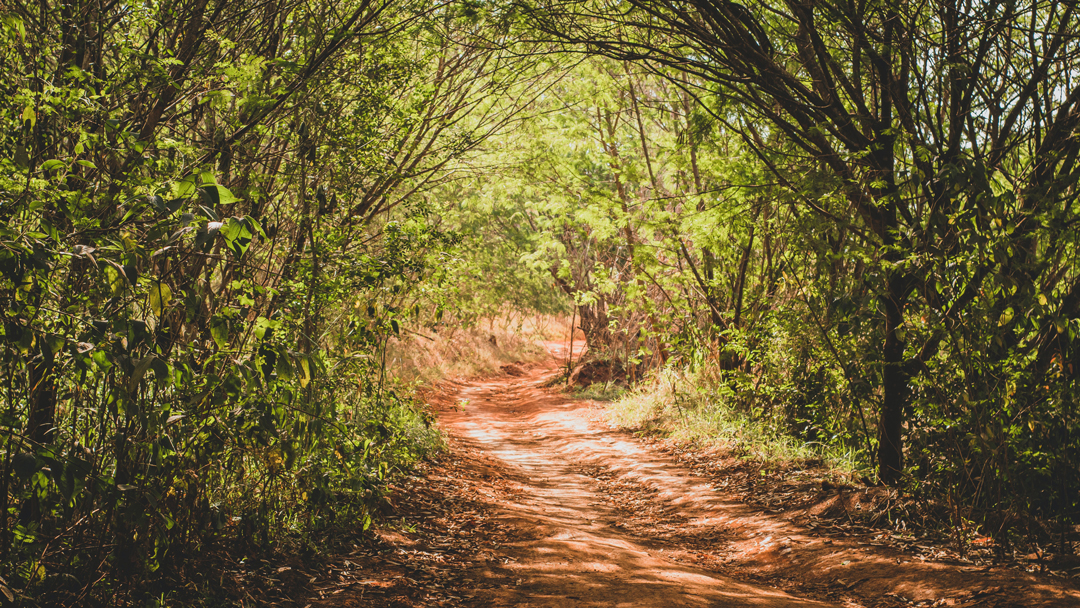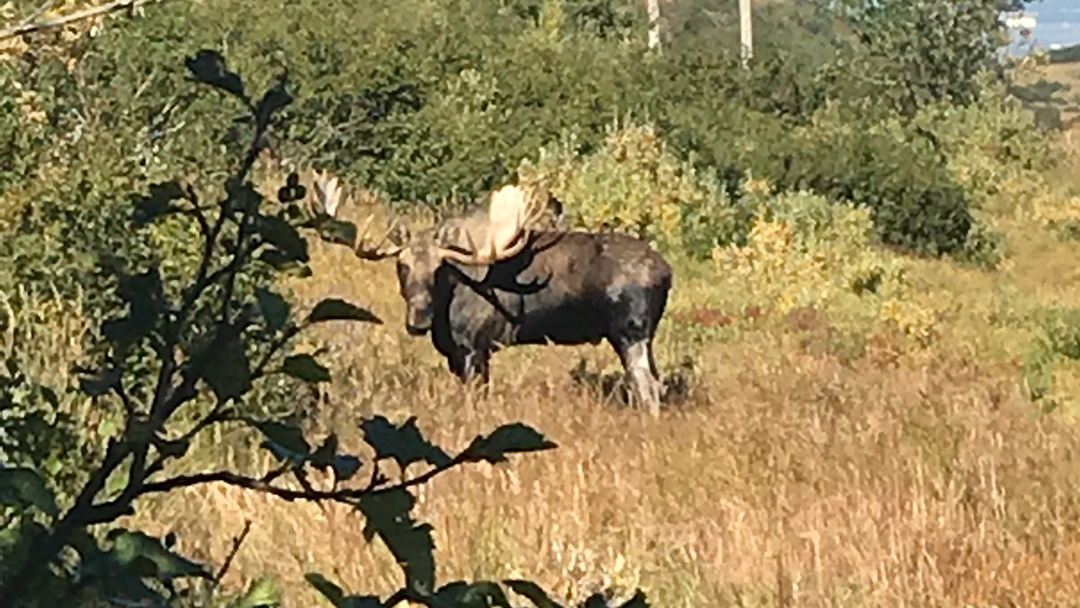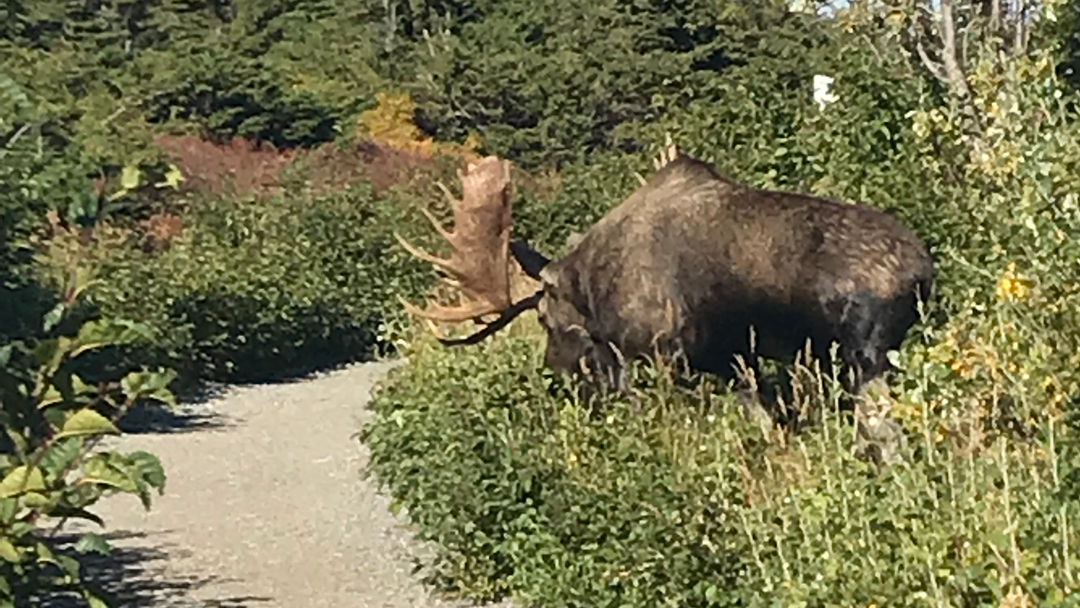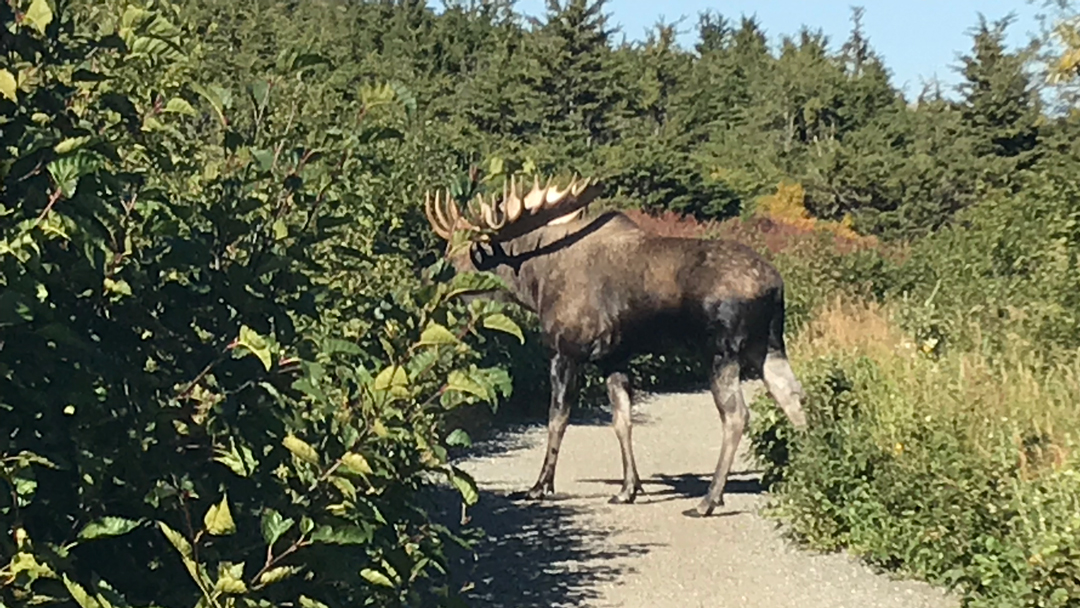Just Beyond the Bushes
- Nathan Schneider

The Encounter
I first met Alex Prokopenko in 2018 when he came to Anchorage to speak at a conference AGC was hosting as an outreach to the Russian-speaking community in Anchorage. Alex is a graduate of The Master’s Seminary, currently finishing up his PhD in Old Testament there, and working as a professor at Samara Center for Biblical Training, a school in Samara, Russia that is part of a larger network of theological seminaries belonging to The Master’s Academic International.
There was a lot of fruit that came from Alex’s time in Anchorage. The conference was aimed at jumpstarting a larger ministry to Russian-speakers, which is a passion of Oleg and Amanda Bondar, who are part of our church family and who are good friends with Alex. In fact, they’re the ones who first suggested we bring Alex up to speak here.
During Alex’s time here, he also had an opportunity to sit down and talk with the AGC missions committee about his ministry in Samara and the work they are doing there to train Russian men for pastoral ministry. Out of that meeting and subsequent conversations, AGC began supporting Alex and his family as part of our missionary team. Additionally, we also began support for the larger TMAI organization.
However, I think the most impactful time I spent with Alex during his stay in Anchorage was on the Monday following the conference. The day was particularly beautiful for September…sunny, warm, and not a cloud in the sky. Alex had been staying with the Bondars, but with Oleg at work and Alex departing later that evening, he was left without much to do that day. At Oleg’s suggestion, I invited Alex to join me for a hike.
I picked Alex up in late morning with the plan to drive up to the Glenn Alps parking lot. Neither of us were interested in a more strenuous outing, so rather than journeying up to the summit of Flattop, we opted to take a spirited stroll down the Powerline trail. At this time of year, it was the perfect opportunity to see some wildlife. With the beginning of the rut, there was a good chance we could see some impressive-sized bull moose along the way.
The time I spent with Alex was important and impactful. It gave us a long time to talk about life, about ministry, and about family. We hiked down the trail for a couple hours before deciding it was probably time to head back. Not long after we turned around, something happened that Alex and I will never forget.
Anyone who has walked the Powerline trail knows that there are sections of that trail where the vegetation grows so thick on either side of the trail that it’s impossible to see anything except what’s in front of you. From my experience hiking in Alaska, those kinds of scenarios make me particularly nervous, but there’s not much one can do except to press on and make some noise.
As we rounded a bend in the trail, we came upon another hiker. He had a large camera and lens hanging from his neck, and when he saw us he immediately stopped us and came over our way. We asked him what was up, and that’s when he told us to follow him through a small opening in the wall of bushes and shrubs. We scrambled through the branches and came out into an opening on the other side, then followed our gaze in the direction of he was pointing. Not thirty yards away stood one of the largest bulls I’ve ever seen. Its rack was massive. As it moved its head, the rack swung from side to side, as if there was a giant canoe strapped to its skull. It was one of the most impressive sights I’ve ever seen.
The bull was just standing there in the clearing, nosed right up against the bushes that separated it from the trail. It was obviously aware of us, because from time to time, it was look our direction, absolutely uninterested in who we were or what we were doing there.
After a few minutes, we made our way back through the thicket of bushes, finding the trail once again. At that point, I think Alex and I were both a little shocked that something of that mass and scale could be hiding so easily behind the trees. We had been completely unaware of it. Without this hiker’s warning, we would have walked right past. In fact, as we stood there talking, a number of cyclists came by, speeding down the dirt trail completely oblivious, it would seem, to the bull that was right beside them in the bushes.
But it didn’t stay that way for long. The moose began to move, making its way steadily but slowly through the thick brush. We could hear it coming as it scraped its wide antlers through the bramble of limbs and trees. After a moment, it came out onto the trail and paused for a long time.
The thing is, this moose was on a mission. On the other side of the trail, just past the bushes and above us on a small rise was a cow, maybe fifty yards away. Once the bull was on the trail, the calls started, and pretty soon the bull sauntered off the trail, through the brush on the other side and up the hill toward the cow. After a while, we decided to move on, feeling like it was a little awkward for this fellow for us to gawk and take photos while he tries to court his gal. So, not wanting to be lumped in with the paparazzi, Alex and I kept hiking back to the car, a little dazed by what we had just observed.
Below are some photos and a video I was able to take during the encounter. About halfway through, you can hear the bull making his desperate, pleading grunts to the cow he is pursuing on the far side above us. As he approaches her, you can hear the cow making her luring, sultry call in return. Honestly, though, they only capture a fraction of the beauty and the power of the animal we observed…the animal we almost walked right past had it not been for the friendly hiker we ran into.
I was thinking about that moment this week for some reason, and it got me thinking about a spiritual principle it illustrates particularly well.
It’s very easy to go from day to day through life without the slightest concept of the danger that lies before and around us. Even in the middle of this pandemic, with the reminder of the COVID threat on each masked face and shuttered restaurant, we remain in large part oblivious to just how dangerous our world is and just how un-secure we really are. Sure, we can build up bank accounts, keep a steady job, go to the doctor regularly, keep all our fire alarms stocked with fresh batteries, lock and arm the house each night, wear our seatbelts in the car, drive vehicles with fifty airbags, salt the driveway in the winter, etcetera, etcetera, etcetera. And all those things make us feel secure. But we don’t really know what danger lurks around each corner. We can’t control every aspect of life. We’re like two hikers walking down a narrow trail lined with tall brush, making some noise and thinking we’re alone. But we have no idea if there’s a massive animal just beyond the bushes…
The Sermon
On July 8, 1741 in Enfield, Connecticut, Jonathan Edwards delivered what is perhaps the most famous sermon ever preached (outside of maybe Jesus’ Sermon on the Mount). The biblical text from which he expounded was simple and clear:
“Their foot shall slide in due time…” (Deuteronomy 32:35)
From this one text, Edwards made his point crystal clear: “There is nothing that keeps wicked men at any one moment out of hell, but the mere pleasure of God.” He went on to more fully describe what he meant by this “pleasure of God,” when he said,
By the mere pleasure of God, I mean his sovereign pleasure, his arbitrary will, restrained by no obligation, hindered by no manner of difficulty, any more than if nothing else but God’s mere will had in the least degree, or in any respect whatsoever, any hand in the preservation of wicked men one moment.
What Edwards was getting at was the urgency of hell…the reality that there is a place of judgment which is the final resting place of all individuals who have not found refuge in Christ. And there is nothing the sinner can do to keep himself from it. The only thing that separates the sinner from the eternal torment of hell is the decision of God. And what Edwards desperately wanted his congregation to recognize was that they couldn’t live life oblivious to this fact. They couldn’t live as if they were alone on the trail. They had to recognize that they weren’t really safe at all.
The problem was, and still is, that we don’t realize just how angry God is with us. We have so downplayed our sinfulness, and softened the wretchedness of sin, that we don’t recognize how much danger we are in. That’s why Edwards’ sermon was so powerful. Using evocative imagery, Edwards painted the reality of hell, the anger of God, and the danger facing every sinner in such a way that it was impossible to ignore:
The God that holds you over the pit of hell, much as one holds a spider, or some loathsome insect over the fire, abhors you, and is dreadfully provoked: his wrath towards you burns like fire; he looks upon you as worthy of nothing else, but to be cast into the fire; he is of purer eyes than to bear to have you in his sight; you are ten thousand times more abominable in his eyes, than the most hateful venomous serpent is in ours. You have offended him infinitely more than ever a stubborn rebel did his prince; and yet it is nothing but his hand that holds you from falling into the fire every moment. It is to be ascribed to nothing else, that you did not go to hell the last night; that you were suffered to awake again in this world, after you closed your eyes to sleep. And there is no other reason to be given, why you have not dropped into hell since you arose in the morning, but that God’s hand has held you up. There is no other reason to be given why you have not gone to hell, since you have sat here in the house of God, provoking his pure eyes by your sinful wicked manner of attending his solemn worship. Yea, there is nothing else that is to be given as a reason why you do not this very moment drop down into hell.
Now, I dare to say that we aren’t used to that kind of preaching. But maybe we should be. Many of us probably recoil at the harshness of his words, at how angry and furious he makes God out to be, and how loathsome he makes us to be. But here’s the deal, if we have a problem with that, it’s our problem, because Edwards is absolutely right. Our sin is loathsome. It is utterly abhorrent to God. And there is no reason we should still be alive on this earth save for the merciful restraint God demonstrates in keeping us from hell another day, another minute, another second longer.
He goes on, as a preacher and evangelist, to plead with his congregation to listen and to respond:
O sinner! Consider the fearful danger you are in: it is a great furnace of wrath, a wide and bottomless pit, full of the fire of wrath, that you are held over in the hand of that God, whose wrath is provoked and incensed as much against you, as against many of the damned in hell. You hang by a slender thread, with the flames of divine wrath flashing about it, and ready every moment to singe it, and burn it asunder; and you have no interest in any Mediator, and nothing to lay hold of to save yourself, nothing to keep off the flames of wrath, nothing of your own, nothing that you ever have done, nothing that you can do, to induce God to spare you one moment.
In other words, whatever you do in your life to feel secure is a danger to your soul because you can’t protect yourself from God’s wrath.
In the sermon, Edwards reinforced his thesis with ten “considerations,” which can be summarized as follows:
- God may cast wicked men into hell at any given moment.
- The wicked deserve to be cast into hell. Divine justice does not prevent God from destroying the Wicked at any moment.
- The wicked, at this moment, suffer under God’s condemnation to Hell.
- The wicked, on earth—at this very moment—suffer a sample of the torments of Hell. The wicked must not think, simply because they are not physically in Hell, that God (in Whose hand the wicked now reside) is not—at this very moment—as angry with them as He is with those miserable creatures He is now tormenting in hell, and who—at this very moment—do feel and bear the fierceness of His wrath.
- At any moment God shall permit him, Satan stands ready to fall upon the wicked and seize them as his own.
- If it were not for God’s restraints, there are, in the souls of wicked men, hellish principles reigning which, presently, would kindle and flame out into hellfire.
- Simply because there are not visible means of death before them at any given moment, the wicked should not feel secure.
- Simply because it is natural to care for oneself or to think that others may care for them, men should not think themselves safe from God’s wrath.
- All that wicked men may do to save themselves from Hell’s pains shall afford them nothing if they continue to reject Christ.
- God has never promised to save us from Hell, except for those contained in Christ through the covenant of Grace.
Those last four principles are especially important to think about right now. It’s not always a good thing to feel secure. Because when we start to feel secure, we naturally begin to presume that we’re safe, even from God. But we’re not safe. We’re anything but safe.
But that’s where Christ comes in. There is a shelter from the wrath of God. There is one who has absorbed his wrath, and under whom a sinner can hide for protection. There is one who has bore the wrath on our behalf. We only need reject our sin and embrace him in faith, and we can truly be secure. We can really be safe.
The Plea
For some who are reading this, you need to open your eyes and realize that you are not safe. Like Alex and I, you’re walking down a trail and you think you’re alone, but you’re not. There is a threat. It’s right there off the trail, and it can ruin you, you just don’t see it. Your hope can’t be in anything this world can offer, and it certainly can’t be in yourself. It’s only in the saving protection offered by Christ.
For others reading this, you have embraced Christ. You are safe from the wrath of God because you have placed your whole trust in Christ’s death as the sole means of paying the penalty for your sin. You have received God’s forgiveness and are the recipients of all the undeserved benefits of being adopted by God as one of his children. But that’s not the end for you. Like the hiker on the trail who showed Alex and I the danger beyond the bushes, you have work to do. There are millions of people going through life who don’t know that they are suspended by a single thread, held out of the flames of hell by the hand of God. You hold the message that provides the only sure escape from that fire. You have to warn them.
Edwards was that hiker. And his sermon was a key component in bringing about what we know today as the First Great Awakening. But he was just being faithful to warn people. Imagine what could happen if God’s people preached the gospel message today with the same power and uncompromising conviction. Imagine the awakening God could effect. Just as he opened our eyes to his wrath and his grace, he can through us do the same to others.













